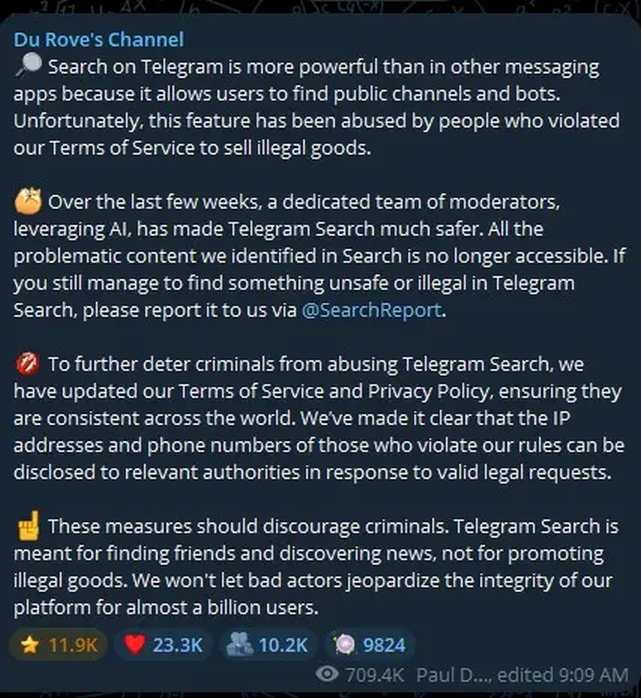Telegram will now share user private data with government authorities, CEO Pavel Durov says

Telegram has taken a major step back from its privacy-first stance, now agreeing to share user data with government authorities. CEO Pavel Durov, facing mounting legal pressure, confirmed the decision, stating it’s part of an effort to crack down on criminal activity.
According to a report from the New York Post, Durov will now comply with valid government requests for user IP addresses and phone numbers. This marks a significant shift for Telegram, long known for its strong stance on privacy and resistance to data-sharing requests. The change follows Durov’s recent arrest in France, where he faces charges, including allegations of enabling illegal activity on the platform.
“Embattled Telegram CEO Pavel Durov reportedly agreed to hand over IP addresses and phone numbers of those who use his encrypted messaging app to government authorities that make valid legal requests,” the NY Post reported.
Telegram’s Privacy Promise Broken: User Data to be Shared
Just weeks ago, Telegram quietly updated its privacy policy. The changes were first noticed when posts on social media pointed out the removal of statements claiming that all chats were completely private. Previously, Telegram was clear about its reluctance to cooperate with authorities, but the new terms suggest the company is aligning its policies globally, as Durov explained in a post on his Telegram channel.
Telegram built its reputation on providing secure, end-to-end encrypted messaging, drawing in hundreds of millions of users who valued the platform’s commitment to privacy. But that same commitment made it a target for critics who argue the app is a preferred tool for criminals involved in activities like money laundering, sex trafficking, and child exploitation.
Historically, Telegram has collected minimal data compared to its competitors and only considered sharing information when legally required by a court order. However, with Durov under pressure, the company has now removed language from its FAQ page that previously reassured users their data wouldn’t be shared.
Earlier this month, Durov made a public commitment to step up efforts to prevent illegal use of the platform. In a Telegram post, he pushed back against the charges brought by French authorities, arguing that holding a CEO accountable for crimes committed by others on their platform is a flawed approach. He emphasized that this kind of legal action could stifle innovation, as no developer would want to take personal responsibility for the misuse of their tools.
“Using laws from the pre-smartphone era to charge a CEO with crimes committed by third parties on the platform he manages is a misguided approach. Building technology is hard enough as it is. No innovator will ever build new tools if they know they can be personally held responsible for potential abuse of those tools,” the post said.

Despite the controversy, Durov maintains that Telegram is not a lawless space. He acknowledged the challenges that have come with the app’s rapid growth, which has allowed some bad actors to take advantage of the platform.
Durov, who founded Telegram after leaving Russia due to censorship issues with his earlier social media platform VK, has also faced ongoing speculation about Russian influence over Telegram. He has consistently denied these claims, attributing them to competitors worried about Telegram’s rise.
Having lived in cities like Berlin, London, and San Francisco, Durov has frequently voiced concerns about the bureaucratic and security risks posed by U.S. agencies. He argues that companies like Apple and Google pose a greater threat to free speech, given their control over app content. This concern influenced his decision to base Telegram in the UAE, which he sees as a diplomatically neutral location.
Durov’s vision for Telegram is a platform that promotes open dialogue, offering a space for diverse voices. He’s known for embracing minimalism and prioritizing personal freedom over material wealth, values that reflect how he leads the company.
Telegram saw a massive boost in users, surpassing one billion in April, following the backlash against WhatsApp’s 2021 privacy policy update. This surge cemented Telegram’s status as the most downloaded app globally. Founded by Durov in Dubai in 2014, Telegram has since become a symbol of resistance to censorship, though its latest move may challenge that reputation.

Telegram CEO Pavel Durov




